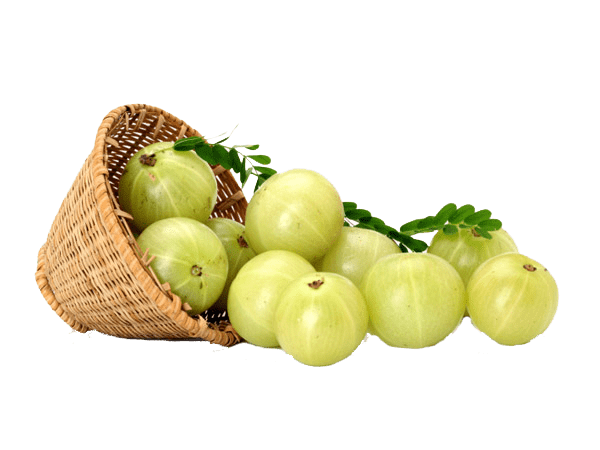Amalaki
Indian gooseberry
Emblica officinalis/ Phyllanthusemblica
Amalaki is a ‘super fruit’ native to tropical Southeast Asia and distributed throughout India. It has gained a following throughout the world as an ‘immunity booster’. These small berries are round, yellow-green and fruit from April to October. They are quite sour on their own and cool in nature.
आमलकी
वयःस्थापनानाम् ।


Acharya Charak has described Amalaki as one of the best Vayasthapana (anti-ageing) herb. It is the main ingredient in many historic dosage-forms including Avaleha – Chyavanprash. Incorporating this ancient super fruit into your daily routine may improve your overall health. Here are some benefits that Amalaki can offer.
Health from Amalaki
Amalaki is one of the three fruits contained in Triphala. Ayurveda texts describe Amalaki as tridosha-hara (pacifies all three doshas). Amalaki is rich in antioxidants, polyphenols, alkaloids, and flavonoids especially ascorbic acid and Gallic acid. It is commonly known to contain vitamin C.
- Assists natural internal cleansing and detoxification
- Reduces anorexia, supports healthy metabolism and digestion
- Helps reduce nausea and constipation
- It is anti-inflammatory and cool in nature hence, pacifies pitta and bleeding disorders
- Nourishes the cardiac and respiratory system
- Promotes healthy eyes and skin
- Balances agni i.e. digestive power
- Builds a healthy immune response
- Beneficial in bleeding disorders, diabetes and related complication like loss of libido if consumed with Haritaki
Amalaki for Rasayan (Detoxification and Health Rejuvenation)
Amalaki is rich in antioxidant, flavonoid and tannin content. Modulation of agni (digestive power) by Amalaki not only detoxifies the Gut, but also improves whole body tissues’ metabolism. Thus, it promotes youthfulness, boosts immunity, tones sapta-dhatus (vital body tissues) and promotes overall health and well-being. It is also rich with iron complexes and has a particular affinity for the blood, liver and spleen. Therefore, is able to drive the elimination of natural toxins while empowering the body’s natural defence mechanisms.
Amalaki for Diabetic Health
Amalaki has the ability to stimulate microcirculation and nourish Sapta-dhatus (vital body tissues) which helps to maintain healthy blood sugar levels and urinary system. It helps to slow the rate your body absorbs sugar and reduce blood sugar spikes.
Amalaki for Skin Health
Amalaki helps increase the production of collagen level in your skin. This will make your skin look soft and youthful. It lightens your skin marks and reduces skin pigmentation. It can help your skin age slowly, look better and beat ageing cells.
Amalaki for Hair Health
Amalaki can do well for your hair by making them smooth and silky. It prevents Amalaki premature greying of hair, dandruff, dryness of hair and hair-fall.
Amalaki offerings from Sandu
Sandu Makarprash: A traditional Chyavanprash fortified with Naradiya Laxmivilas Rasa (Suvarna containing) and Makardhwaj Rasa (processed with Suvarna)
Sandu Chyavanaprash: A traditional Chyavanprash fortifies with Rajat and Makardhwaj Rasa
Triphaladi Kadha: Amalaki in potent ready to consume and stable Kadha form
Triphala Churna: Amalaki combined with Haritaki and Bibhitak (in equal quantity) to benefit in eye, skin, digestive and diabetic health.
Triphala Guggul: Triphala combined with Guggul is an excellent analgesic, anti-pyretic and anti-inflammatory combination
References
Khan, K. Hayat. “Roles of Emblica officinalis in medicine-A review.” Bot Res Int 2.4 (2009): 218-228.
Venugopal, Shonima, Uma Iyer, and Richa Sanghvi. “Glycemic response of Emblica officinalis powder-incorporated Indian recipes.” Nutrition & Food Science (2020).
Ahmed, Inshah, et al. “Effect of Emblica officinalis (Amla) on Monosodium Glutamate (MSG) Induced Uterine Fibroids in Wistar Rats.” Research Journal of Pharmacy and Technology 13.6 (2020): 2535-2539.
Akter, Tahmina, et al. “Haematopoietic Effects of Amloki (Emblica officinalis) in Pregnancy with Iron Deficiency Anaemia.” Journal of Biosciences and Medicines 8.12 (2020): 157.


